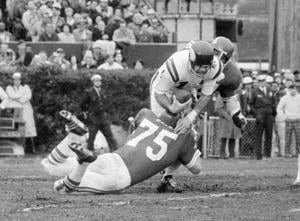Former Vikings, Cal QB Joe Kapp dies at age 85

Joe Kapp, the hard-nosed quarterback who routinely ran into tacklers instead of away from them while leading the Minnesota Vikings to their first Super Bowl and California to its last Rose Bowl, has died. He was 85.
Cal confirmed that Kapp died on Monday. He had suffered from Alzheimer’s disease for the last 15 years and was residing in an assisted living facility, his son J.J. Kapp said.
The family made plans to send his brain to UC San Francisco researchers for study of the potential connection between his dementia and hits he took to the head with his punishing playing style.
After a stellar collegiate career at Cal that was capped by an appearance in the 1959 Rose Bowl, Kapp went on to star in Canada before making it to the NFL. He took over for Fran Tarkenton in Minnesota and led the Vikings to a Super Bowl appearance in the 1969 season before losing to Kansas City.
People are also reading…
Kapp is the only quarterback to lead his team to a Rose Bowl, Grey Cup and Super Bowl. He still holds a share of the NFL single-game record with seven touchdown passes, in a 1969 win over Baltimore.
“It was kind of like having your own superhero living in your house,” J.J. Kapp said in a phone interview with The Associated Press.
Kapp also later coached his alma mater for five seasons and was on the sideline for one of the most memorable plays in school history when the Golden Bears returned a kickoff with five laterals to beat rival Stanford on the final play in 1982, scoring the touchdown with the Cardinal band on the field.
When he was hired to coach at Cal before the 1982 season, he vowed not to drink his favorite alcoholic beverage tequila until the Bears made another appearance in the storied bowl game. They never made it back in his lifetime. Kapp had a 20-34-1 record in five years at Cal, his final game being the biggest upset in the history of the rivalry with Stanford when the Golden Bears won as 21-point underdogs.
“Playing for and coaching at Cal meant the world to him,” J.J. Kapp said.
His grandson, Frank Kapp, also played for the Golden Bears. Kapp was cognizant of the toll the sport took on his body and mind, but nonetheless he was proud of his career.
“He used to tell people to put your son in piano lessons and not let them play football, but he let me play and he let my brother play,” J.J Kapp said, adding: “He never regretted playing football.”
Kapp spent his first eight seasons in the CFL with Calgary and the BC Lions. He took the Stampeders to the playoffs in his second season and led the Lions to back-to-back Grey Cup appearances, winning it all in his second try in 1964.
“Along with helping put the Lions on the map after some lean early years, Joe also served as a trailblazer for quarterbacks making a name for themselves on both sides of the border,” the BC Lions said in a statement.
He then went to the NFL in 1967 as part of a complicated trade between teams in different leagues and replaced Tarkenton, who had been traded by Minnesota to the New York Giants.
Kapp helped the Vikings make the playoffs before losing to Baltimore in 1968 and then threw 19 TD passes and led Minnesota to a 12-2 record the following year when he finished second in MVP voting.
He ran and threw a TD pass against Cleveland to lead Minnesota to a 27-7 victory in the 1969 NFL title game. The Vikings then lost the last Super Bowl before the merger to Kansas City. Always a team-first player, Kapp was voted Most Valuable Player by the Vikings that season but refused to accept it on his stance that all 40 players on the roster were equally valuable. He coined the mantra “40 for 60,” referencing every player giving his best for all 60 minutes of the game.
Kapp left as a free agent the following season and played briefly for the Patriots in 1970. He refused to sign with the team after New England drafted Jim Plunkett first overall in 1971 and never played again. He filed an antitrust suit against the league that he eventually lost, but it helped pave the way for the free agency system that eventually took hold.
Kapp was born in Santa Fe, New Mexico, and moved around California as a child before becoming a four-sport athlete at Hart High School in Newhall and becoming the first person in his family to attend and graduate from college. Kapp helped lead Cal to the Pacific Coast Conference title in 1958 and the accompanying trip to the Rose Bowl, where the Bears lost to Iowa. He also played basketball at Cal.
Known as a fighter on the field, Kapp was the subject of a Sports Illustrated cover story that dubbed him “The Toughest Chicano.” That was the title of Kapp’s autobiography published in 2019 and co-authored by J.J. Kapp and two other friends.
Off the field, Kapp was a fierce advocate for the Latino community who worked with activist Cesar Chavez for farmworker rights. He also dabbled in acting, with credits that include a role in the 1974 film “The Longest Yard” about a prison football team.
Kapp was survived by his second wife, Jennifer Kapp; four children and six grandchildren. His first wife, Marcia Kapp, died in 2005.
For all the latest Sports News Click Here
For the latest news and updates, follow us on Google News.

